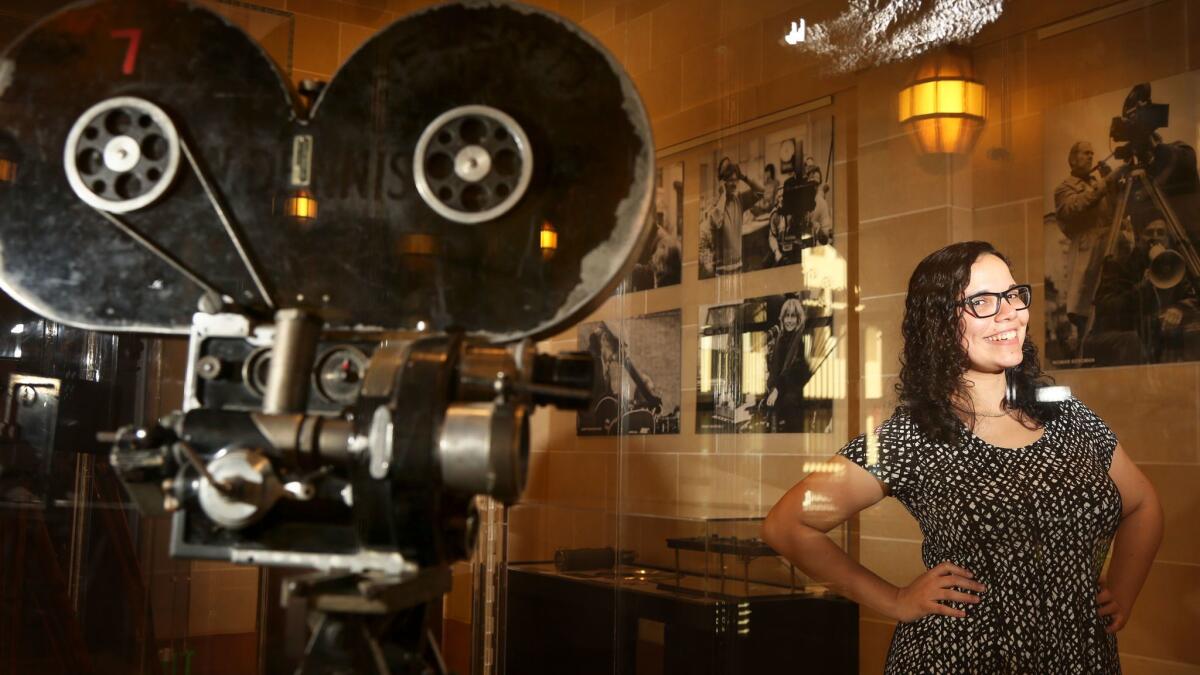$2 million endowment from the Hollywood Foreign Press Assn. helps foreign storytellers study at USC

- Share via
It was always Anna Israel’s dream to be a filmmaker. Born and raised in Rio de Janeiro, Israel first studied law at the urging of her parents before dropping out to pursue screenwriting at a Brazilian university. After finishing the program and brief stints at NYU, Cornell and UCLA, she knew where she had to go next.
“I’ve always had my eyes set on USC,” said Israel, 30. “I had no idea what I was going to do if I actually got in — not only is it super competitive, but I had no way to afford my education at USC at all. Especially because I was counting on my own money sources, I didn’t have family backing me up.”
Israel’s story is similar to many other international students who have a difficult time obtaining funding to study in the U.S. But after getting accepted to USC, Israel also learned that she was the recipient of a George Lucas scholarship, a program for African American and Latino film students that made it possible to pursue her dream as an MFA screenwriting student.
A $2 million endowment from the Hollywood Foreign Press Assn. to USC’s School of Cinematic Arts will help even more talented, foreign filmmakers to study in the U.S. The HFPA is known for presenting the Golden Globe Awards, but the organization also has numerous philanthropic activities, including supporting aspiring filmmakers.

Aimed at graduate students, the endowment will provide funding for students who are not eligible for U.S. loans and must sometimes navigate unfavorable exchange rates to live abroad.
“We thought it was going to be a good idea to help USC fill that gap and make sure that those students from any country in the world who deserve to be in that great school can also be part of the next generation of filmmakers,” said Lorenzo Soria, the HFPA president.
From #OscarsSoWhite to Meryl Streep’s Golden Globes speech about Hollywood’s “outsiders and foreigners,” there has been increased attention to the need for more diversity in Hollywood. Iranian director Asghar Farhadi boycotted this year’s Oscars to protest President Trump’s crackdown on immigration, particularly from the seven predominantly Muslim countries in the original order. His film, “The Salesman,” won the foreign language Oscar.
The academy added many more foreigners to its membership in 2016, but those go to established filmmakers and actors. Endowments and scholarships for international students intervene at the beginning of the pipeline, helping foreign talent break into the industry.
I think now more than ever we need to recognize that we are global, we are here and we really want students from every corner of the world.
— Elizabeth Daley, dean of USC’s School of Cinematic Arts
“We love having international students,” said Elizabeth Daley, dean of USC’s School of Cinematic Arts. “I think now more than ever we need to recognize that we are global, we are here and we really want students from every corner of the world. It makes our industry stronger and I think we just plain make better films when we have lots of different voices speaking.”
USC’s film school has nearly 1,700 students, over 680 of them are graduate students and of that, nearly 30% are international graduate students who are on visas. Among its alumni are directors Bryan Singer and Judd Apatow, and TV showrunner Shonda Rhimes.
According to Daley, most graduate students receive financial aid, but there is little assistance available for foreign students.
“We want to help people, empower them to tell their stories, empower them to paint positive pictures,” Daley said. “Film and television are the biggest megaphones in the world so one of the things we wanted to do was help people know how to use them to achieve what they want.”
For over 25 years, the organization has given more than $20 million to initiatives including educational programs and film conservation efforts, and has supported over 1,000 students studying film. Its recent endowment to USC is its largest devoted entirely to international students.
This year, Israel is working on a story about slavery in 1800s Brazil. She counts Oscar-winning director Alejandro G. Iñárritu as one of her biggest inspirations. Born in Mexico City, Iñárritu has directed award-winning films “Birdman” and “The Revenant.”
“Having diverse storytellers in the industry that has the biggest reach in the world, it brings us the opportunity to hear stories that we would never be able to hear otherwise,” said Daley. “When we hear those stories we look at things in the world around us in a different light.”
More to Read
Only good movies
Get the Indie Focus newsletter, Mark Olsen's weekly guide to the world of cinema.
You may occasionally receive promotional content from the Los Angeles Times.











